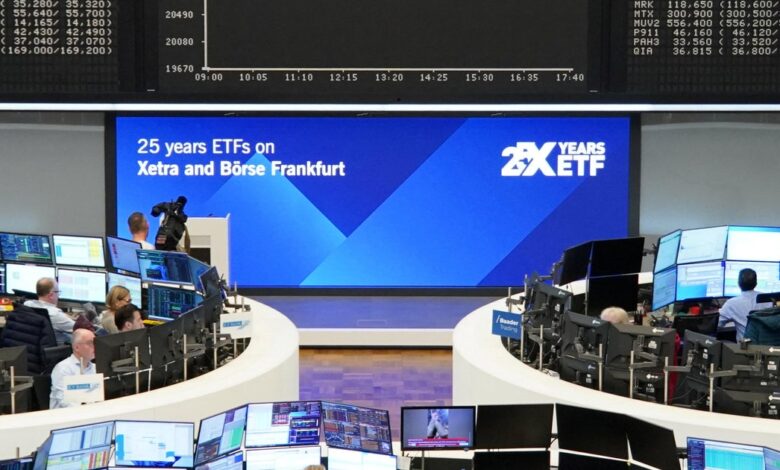World markets jump after Trump delays most tariff hikes, though U.S. futures move lower

World markets experienced a significant surge on Thursday, driven by President Trump’s decision to pause his sharp tariff hikes for 90 days. This move was met with relief by investors, leading to a positive impact on global stock markets. However, China was excluded from this reprieve, causing U.S. futures to move in the opposite direction.
S&P 500 futures were down 1.57%, Dow Jones Industrial Average futures declined by 1.19%, and Nasdaq composite futures dropped by 1.88% as of 7:50 a.m. EST. Despite this, Germany’s DAX and France’s CAC 40 saw gains of 5.3% and 5%, respectively, while Britain’s FTSE 100 surged by 4.0%. Chinese shares also experienced moderate gains, despite the ongoing trade tensions between the U.S. and China.
The global comeback in markets was not unexpected, considering the positive response from investors following Trump’s decision. Japan’s Nikkei 225 jumped by 9.1%, Australia’s S&P/ASX 200 soared by 4.5%, and South Korea’s Kospi gained 6.6%. Hong Kong’s Hang Seng and Shanghai Composite also saw increases in their respective indices.
Stephen Innes, managing partner at SPI Asset Management, described the shift in investor sentiment as going “from fear to euphoria.” The announcement of the tariff pause provided a sense of relief, particularly for Asia’s exporters.
On Wall Street, the S&P 500 surged by 9.5%, marking one of the best days in history for the market. The Dow and Nasdaq composite also posted significant gains. The relief rally came after worries about the impact of Trump’s trade war on the global economy.
Despite the positive response, uncertainties remain, as Trump maintained tariffs on Chinese products and hinted at further increases. The trade war between the U.S. and China continues to pose a risk to the global economy and financial markets.
The bond market also saw a rebound following a smooth auction of U.S. Treasurys. Higher Treasury yields had initially raised concerns, but Trump’s announcement of a tariff pause helped alleviate some of the pressure on the bond market.
In energy trading, benchmark U.S. crude and Brent crude prices declined, while in currency trading, the U.S. dollar fell against the Japanese yen and the euro.
Overall, the markets reacted positively to Trump’s decision, but the ongoing trade tensions between the U.S. and China continue to be a point of concern for investors. The volatility in global markets underscores the need for caution and vigilance in the current economic climate.





